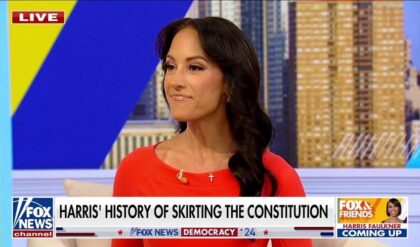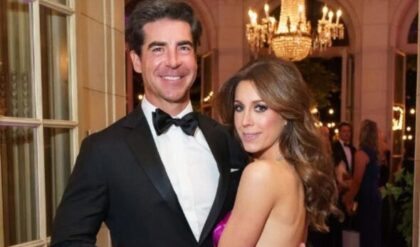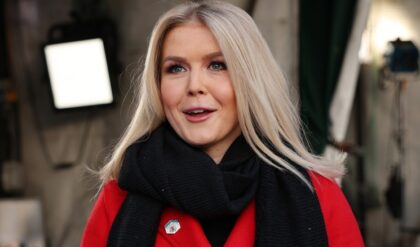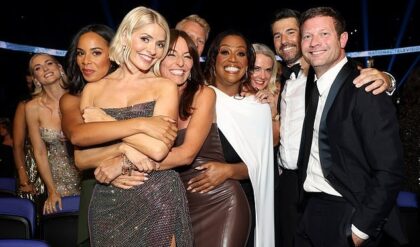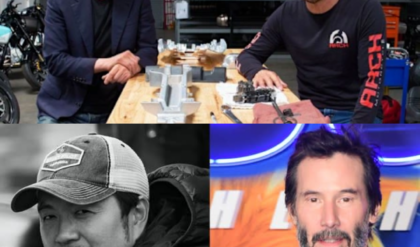he Emmy nominees dive deep into their freezing-cold shoot and dynamic onscreen relationship. Plus, see which episodes acting nominees submitted, take a look back on our full season of coverage, and more in EW’s “The Awardist” digital magazine.
Illustration by Zoë van Dijk
Jodie Foster wanted her True Detective: Night Country character to be ‘as awful as possible,’ Kali Reis recalls those ‘brutal’ below-zero night shoots
Interview by Kristen Baldwin
Illustration by Zoë van Dijk
Jodie Foster and Kali Reis are ready for their next project together.
“We’re doing the whole roommate New York thing,” Reis says, wasting no time answering when Entertainment Weekly presents them with a few options for potential vehicles: an Odd Couple-style sitcom playing New York roommates; a heist drama like Hell or High Water; or a sci-fi thriller like Alien.
Project Dream StaffParadero, empowering women at
Ad
Foster agrees. “Especially because Kali is a great comedian. She is so funny,” the two-time Oscar winner and first-time Emmy acting nominee says on the Awardist podcast. “It’s an untapped part of her personality. And people don’t realize that I’m funny because I choose very serious parts.”
“No, you’re hilarious,” Reis says, interrupting to assure her costar. “You’re a good hype man. You put the battery in people’s backs.”
Michele K. Short/HBO Kali Reis and Jodie Foster in ‘True Detective: Night Country’© Provided by Entertainment Weekly
It’s no wonder the audiences and critics — and the Television Academy — loved them so much on True Detective: Night Country, the fourth installment in the series. While the two came to their roles via very different career paths — a former child star turned Hollywood legend and a former professional boxer turned actor — they became one of the year’s most compelling onscreen duos, just two of the show’s 19 Emmy nominations.
Below, the two reunite for a chat about their season of the hit HBO series (this one set in Alaska and created, written, and directed by Issa López). The two reveal their first impressions of their characters — Foster’s police chief Liz Danvers and Reis’ trooper Evangeline Navarro — the big questions they had for López, how Danvers and Navarro changed from the original scripts, what it really felt like filming in subzero temperatures in Iceland, and more.
Check out more from EW’s The Awardist, featuring exclusive interviews, analysis, and our podcast diving into all the highlights from the year’s best in TV.
Illustration by Zoë van Dijk
THE AWARDIST: You’ve both talked about how you were really drawn in by the script — after you read it, what was the biggest question you had for creator Issa López about your character?
KALI REIS: I was like, “What happened in your childhood to make you create this character?” [Laughs] No, I was just so blown away [by] how complex [she is] and how much I still didn’t know about her. I’m like, there’s so much information that she brought to me with her and she was so full of a lot of things but I’m like, there’s so much more here. That was so intriguing about my character.
JODIE FOSTER: It was really fun — just about Kali’s — it was really fun to participate in the rehearsals that we had right before shooting because a lot changed. Once we got everybody in the room — and you don’t usually do that; we don’t usually hear the character process from the other actors — so there was something really wonderful about hearing John Hawkes talk about his character or Finn Bennett talk about his character, [Isabella] LeBlanc. So we were able to kind of change things based on what other people brought to the table, which was nice. My character, as you know, was different when I first saw it. She was a much nicer person. And then I got in the mix and decided to make her as awful as possible, just to flesh out and to make sure that it was serving the central story, which is Kali’s story.
Kali, in another interview you described it as making her more of a, quote, “racist-ass white lady,” which I loved.
REIS: [Laughs] An Alaska Karen. The more racist and not woke and so unaware that she got it was just like, this is good. It gave me a lot to work with, though, because it gave me context to, like, does Navarro know this much about her? About all the characters. So the more a–hole she got — the “a–holization” I think Issa used is — it was interesting more. Like, does it affect her? So yeah, it was a lot to play with.
HBO Jodie Foster in ‘True Detective: Night Country’© Provided by Entertainment Weekly
Kali, I’m also interested to know what your reaction was when you learned that Jodie Foster was like, “I want more of Kali’s character”?
REIS: You know what, it made me look at the whole story, and I saw what Jodie saw for it. It made me really pinpoint certain things that need to get highlighted a little bit more on my character as well. This is an important point that we can highlight and we can both go towards that way and also highlight the other characters in the story that are attached to Navarro, be it her sister or the environment or the culture behind the entire story. So it was really an awesome time to just be able to highlight those different things. It is centralized around the place, and Navarro is from that place.
FOSTER: I think the humor was the biggest revelation that happened as we got together, when we finally got to be in the same room. I hadn’t realized how funny Danvers was and what a sparring partner she had. They were really sparring together and they both were sort of trying to outdo how hurtful they could be as humor-related sparring partners.
It’s kind of like a divorced couple that still has feelings for each other. The way they go at each other is so funny. So with a story like this, when it’s so suspenseful and a twisty mystery, as performers, do you guys want to know how it ends before you start shooting — if you have that luxury — or is it better to not know? Kali, I believe you didn’t know, right?
REIS: I knew the whole story, but I don’t have anything to compare it to. I’ve never done anything as of yet to not know the whole story. And it was just like doing a big movie. So we knew the whole story. However, reading it was still shocking, and it never lost the excitement for me, no matter how many takes we did, no matter how many times I had to reread because we were all over the board when we were shooting; it wasn’t in order.
I like knowing because I still am able to discover new things about my characters, about the story, instead of trying to figure out the story in itself. All right, now I know what happened, so let’s focus on the little details.
Michele K. Short/HBO Kali Reis and Jodie Foster in ‘True Detective: Night Country’© Provided by Entertainment Weekly
FOSTER: I think it’s pretty important for the actors to know where the train’s headed. That being said, stuff happens while you’re shooting. And when I first read episode 6 specifically, I never saw it coming — I had no idea that that’s how this show was gonna end. And I was just… I remember just finishing episode 6 and being like, oh my gosh, don’t change a thing, that is perfect. But when we started shooting — we shot out of order, of course, just like a big film — I hadn’t really anticipated the power of those sequences, and I’m not in those sequences. So it was great for Kali and I to see those final scenes, and they did manage to kind of cut them together. Remember Kali? They cut them together for us and we were able to see them around the monitor while we were shooting something, and it was absolutely terrifying and it changed everything for us.
I don’t know if you guys watch your shows or not, but I feel like this is a show that really benefits from a rewatch because there are so many characters that you don’t necessarily pay much attention to in the beginning, which is really the point, who end up playing a big role. Did you go back and watch it at all? Is it one-and-done or not at all?
REIS: I really enjoyed it and I recently ended up watching three more episodes over again and I noticed new things. One thing in particular about episode 6 that I noticed when I watched it again was the fact that somebody’s standing behind the bar when they’re at Tsalal Station. There’s little things in [the episodes] that are like, that’s terrifying! So I did. It is really a good watch. I watched it a few times. I’m not even gonna lie.
FOSTER: Yep, me too. I’ve been really enjoying watching it again. My kids or friends will come over and they’ll be like, “I wanna watch it.” And then instead of being in the other room or something, I ended up just sitting there. So I have to say, I really loved being a part of this and I don’t usually feel that way. Sometimes I feel like, I don’t wanna see it again because I don’t wanna be reminded of the things that I feel are lacking, but not this time around.
Jodie, I believe this is your first leading TV role since Paper Moon in the ’70s — which, by the way, the pilot is on YouTube, if you ever want to go back and watch it.
REIS: Oh, it is? I’ve never seen it!
Yep, it’s there! Obviously a lot has changed in TV since that time, so I’m wondering what it was about this project and the character of Liz Danvers that made you want to say yes?
FOSTER: Well, I have been directing in streaming, and it is the golden era of streaming. So I feel very lucky that I’m born at this time and able to do streaming. And I was really looking for something to do that moved me, and it took me a while and I finally found this one. This was the first one that I really wanted to commit to. And it is a big commitment, right? So it’s a little different than doing a feature. You meet with the showrunner, but you only get to see maybe one episode before you say yes. You only get to read one script and then maybe the second script comes in, but otherwise, you’re saying yes to eight months to a year-and-a-half of your life based on one 50-page script. So you have to really trust people.
Michele K. Short/HBO Jodie Foster and Finn Bennett in ‘True Detective: Night Country’© Provided by Entertainment Weekly
I want to talk about how each of your characters is introduced because I love the details. When Liz first walks into Tsalal Station, she notices things that her male counterpart, Hank, doesn’t — like how long it takes for mayo to get runny or for laundry to get mildewy. And what I love about it is both of these things are quote-unquote traditionally women’s work, but they give her an edge that he doesn’t have in this case. Jodie, when you first read that scene, what did it tell you about Danvers?
FOSTER: Oh gosh, well, every detail is so Danvers, right? She notices things that other people don’t notice, those details, even though she’s sort of lazy and has decided that she’s not gonna do this, and she’s not gonna give too much to this, she still can’t help herself. But also that she really loves to get under Hank’s skin. [Laughs] And he’s not the only one. I think she has a real Schadenfreude…she just loves getting in there and watching people react to her, watching people with her. It’s almost like she has a feeling of wanting revenge against people that are trying to usurp her power. All those details are right there and fun. It gets fun to watch somebody be a jerk.
With Navarro, she arrives at the cannery investigating an assault, and on the one hand, she’s got a Native woman sort of questioning her background — Bee asks her, “Who’s your Aaka?” — and then she has to physically take down a large dude on her own. So it’s like she’s got it coming at her from both sides. Kali, same question: What did that first scene tell you about Navarro?
REIS: It was crazy reading the first scene because physically you can see this woman means business — you saw her command respect and authority walking in there. She’s the only officer on scene. She’s telling this guy who owns the place, “Have a seat.” And she’s also [showing] her softer side and a kind of a trigger for women who get abused because her whole energy changes when she realized what happened. And also, she is Native but she’s not really part of the community. There’s so much that happens in that one — you can get quite a bit of information from that one scene. And then also, she can handle herself. She has a six-foot-four guy that she has in her hand and answering the phone.
FOSTER: Answering the phone!
REIS: “I can’t talk right now. Give me a second, hold on.” So there was just a lot of that. She’s very confident. She has attention to detail, she has patience. She’s maybe not acknowledged much with the community that she surrounds herself by. There’s a lot. This is an introduction and it’s the first character we get to meet in the whole series too.
FOSTER: The thing about Issa is that she can’t help herself that she finds humor in things that are real. So whatever humor comes out of those moments comes out of a real connectedness to the character, not pratfalls or banter or something. It’s really this place and these people. So in both of those introductions, there’s a lot of humor to them.
HBO Kali Reis in ‘True Detective: Night Country’
Unlike the past three seasons of True Detective, this season starred women, and was created, written, and directed by a woman. How does being part of a female-centric project change your experience on set?
REIS: Even though it’s not the same, but it is the same, in [my boxing] career that I’ve done for a very long time that’s very male-dominated, I’ve seen the shift and seen how it affected me as a fighter being in women’s boxing. Now it’s just boxing because women’s boxing has gotten such a push, especially since we made the Olympics in 2012 — it’s gotten such traction now. I’ve noticed more confidence, we get more respect, and we’re able to do the work and we’re more proud of the work as far as boxing.
Now with this, when it’s a story written by a woman, she’s the showrunner, it gives me more empowerment. And the fact that it’s also women and being from such a matriarchal society and from a matriarchal people, it made me really proud. It’s done really well. So it was like a sign for me: This is where I belong, doing this right now. I was really proud of it. I was really proud to see how successful it is. It wasn’t just like it’s only successful because people are giving it a pity watch. “I’ll watch it because it’s all these women.” It’s a really, really good story. And it just so happened a bunch of badass women are involved in it.
FOSTER: I’ve made a lot of movies in my life and, surprisingly, for the first 45 years of my career, I only made one movie with a woman director. So I’ve really genuinely been here for the switch. As a kid, I just didn’t think I was gonna be able to be a director because I never saw another female face. And now, the last five movies I’ve made, it’s all been women. It’s a big shift for me and it’s really exciting to have that leadership style, and especially as an answer to the next installment of True Detective. Season 1 was an examination of masculine culture and toxic masculinity and all of the kind of tropes and stereotypes that come with that and how they’re debunked in some ways by this friendship between these two people who hate each other. To really see somebody inhabit the other side of that coin and say, “Well, what happens if we put these two people inside this frame, how do they react and what are their connections, for example, to the victim?” Women police officers have a different connection to those victims. Men are thinking about saving their daughters and thinking about saving their spouses or their moms. We’re thinking about saving ourselves. So we relate to the victims in a different way in this iteration. I’m super proud of it.
Michele K. Short/HBO Jodie Foster and Kali Reis in ‘True Detective: Night Country’© Provided by Entertainment Weekly
We’ve got to talk about those filming conditions. You filmed in Iceland, 49 night shoots. Some nights were -23 degrees below zero. Put into words if you can what that does to your body when you’re not just trying to survive, you’re trying to perform, remember your lines, hit marks, all of that. How does that feel?
FOSTER: It was worse for Kali than for anybody else, because she had the worst days. You did have the worst days, and the most outside days.
REIS: I did. I will say, I guess the worst part of it is when you’re standing outside and you’re not saying anything for 20 minutes and then you try to say your line it’s like, [my mouth is] stuck. [Laughs] Growing up in New England, I will say I was well prepared to find my footing with the weather, but that Iceland wind, it just hits you a little different. But the locals definitely schooled us on what materials to wear where, how to wear things. We were layered up. Thank God we were playing police officers that were used to elements. And the cold was cold, but we didn’t have to fake it. We didn’t have to be like, “All right, now I’m in the Arctic.” We were in the Arctic. And it was dark. It was a character itself. And at 2 a.m. night shoot, we get to look up and there’s the Northern Lights. But it was cold, it was freezing, but the worst part was the wind — it would just get in your bones.
FOSTER: And we had our guides. We had our Native people who came from all over the world. So First Nations from Canada and Inuit and Iñupiaq people from Alaska, and then people from Greenland. And the girl who plays your sister who’s such a great actress, I had a scene with her where she’s walking down the street and then she just starts taking her clothes off. And it was so cold that night — and here she was in her bra and I have to have this scene with her and put my arms around her and she was pregnant, which I’m not sure if we knew at the time, but she was pregnant and I was thinking, how do you do this? And she was like, “Yeah, this is nothing. This is nothing.”
REIS: Yeah, “this is nothing.” It’s negative 20. Yeah, they’re built different. I see why they are so resilient because that takes a special type of person to be able to survive and thrive out there. Those conditions are brutal.
FOSTER: And they have their seal oil, and they have a different diet because they come from Greenland and they’re like, “It helps us. We know when we drink our seal oil, we know that we can handle the cold.”
HBO Kali Reis and Jodie Foster in ‘True Detective: Night Country’
You both come to this project from very different career backgrounds. But I believe that anyone you have a good working relationship with you can learn something from. Jodie, what’s something you learned from working with Kali that you’ll take with you into future projects?
FOSTER: Well, Kali is a much harder worker than I am. I was really amazed during rehearsals, and I just felt very privileged during rehearsals to hear her process because anytime you asked her a question about her character — “Why do you think she hesitates for five minutes before she actually gives up the name of this person?” — Kali had the whole thing in her head. And I felt a little bit sheepish because if somebody had asked me that question, I’d be like, “Oh, I don’t know.” And then I’d have to do some work about it. But I really love that about Kali, that she brings every part of her to the table before we start shooting, during the shoot, and afterwards. This has to be the hardest thing that she’s done, but I think Kali thinks every show is like this, but it’s not actually. Not every show is 20 degrees below zero and you’re in every single day and you’re kind of doing a little bit of an accent and you have to kick people. Like, I’m not sure Kali understands that everything else is a lot easier.
REIS: I think that’s been the theme of my life, which has actually been a blessing. I do everything bass-ackwards, I call it. I always do the harder thing first. But if I understand what’s the hardest thing and I can master that, things are usually pretty easy. “If I can do this, I must be able to do the next thing.” But I remember the day we were in the trailer and you blurted out, “This is the hardest shoot I’ve ever been on!” I’m like, if Jodie Foster is saying this, then I am screwed. It’s week two and I was like, oh no! [Laughs]
But I will say, I’ve learned so much from you, honestly, but the best thing that I’ve learned that’s helped me is something that I subconsciously knew but I didn’t really take it into account, is don’t take everything so serious. You are very hardworking, you do prep a lot, I know you put a lot of thought into it, but when it’s what we call fight day, there’s nothing else you can do — if you are there in the ring and the bell rings, if you didn’t do everything you’re supposed to do… and it just gave me more confidence. I know I did everything to get here, so just relax — don’t take everything so serious. You’re going to forget lines; it’s cool because we have sides everywhere. Look, I put it behind the polar bear. You’re supposed to be here, have fun with it. And I knew that, but it was a reassuring thing. And from there I was like, cool, all right, I don’t have to perfect everything. We got this.
This interview has been edited for length and clarity.
Listen to Foster and Reis’ full interview on The Awardist, below.
Drama and Comedy Emmy winner predictions, plus acting episode submissions
With Ted Lasso, Barry, The Marvelous Mrs. Maisel, The White Lotus, The Last of Us, and Succession either out of the race or not eligible in 2024, some new names made the final list of Emmy nominees — right alongside several familiar ones, some of whom have already won in these categories.
Below, check out our winner predictions for the main acting categories, and see which episode the nominees submitted for TV Academy members to consider in this final round of voting.
Netflix; FX
Outstanding Lead Actress in a Drama Series
Jennifer Aniston, The Morning Show – “The Overview Effect”
Carrie Coon, The Gilded Age – “Head to Head”
Maya Erskine, Mr. & Mrs. Smith – “Breakup”
WILL/SHOULD: Anna Sawai, Shōgun – “Crimson Sky”
Imelda Staunton, The Crown – “Sleep, Dearie Sleep”
Reese Witherspoon, The Morning Show – “Love Island”
Outstanding Lead Actor in a Drama Series
Idris Elba, Hijack – “Comply Slowly”
Donald Glover, Mr. & Mrs. Smith – “Couples Therapy (Naked & Afraid)”
(SHOULD ALSO:) Walton Goggins, Fallout – “The Ghouls”
Gary Oldman, Slow Horses – “Footprints”
WILL/SHOULD: Hiroyuki Sanada, Shōgun – “The Abyss of Life”
Dominic West, The Crown – “Aftermath”
FX; ABC; Amazon Ayo Edebiri on ‘The Bear’; Quinta Brunson on ‘Abbott Elementary’; and Jean Smart on ‘Hacks’© Provided by Entertainment Weekly
Outstanding Lead Actress in a Comedy Series
Quinta Brunson, Abbott Elementary – “Party”
Ayo Edebiri, The Bear – “Sundae”
Selena Gomez, Only Murders in the Building – “Ghost Light”
Maya Rudolph, Loot – “Space for Everyone”
WILL/SHOULD: Jean Smart, Hacks – “Yes, And”
Kristen Wiig, Palm Royale – “Maxine Throws a Party”
Outstanding Lead Actor in a Comedy Series
Matt Berry, What We Do in the Shadows – “Pride Parade”
Larry David, Curb Your Enthusiasm – “Vertical Drop, Horizontal Tug”
Steve Martin, Only Murders in the Building – “Sitzprobe”
Martin Short, Only Murders in the Building – “Ah, Love!”
Jeremy Allen White, The Bear – “The Bear”
D’Pharaoh Woon-A-Tai, Reservation Dogs – “Maximus”
Check out Kristen Baldwin’s full winner predictions in the drama, comedy, and limited/anthology series acting categories here.
Other acting episode submissions
SUPPORTING ACTRESS IN A DRAMA SERIES
Christine Baranski, The Gilded Age – “In Terms of Winning and Losing”
Nicole Beharie, The Morning Show – “White Noise”
Elizabeth Debicki, The Crown – “Dis-Moi Oui”
Greta Lee, The Morning Show – “The Green Light”
Lesley Manville, The Crown – “Ritz”
Karen Pittman, The Morning Show – “Love Island”
Holland Taylor, The Morning Show – “White Noise”
Netflix; HBO Elizabeth Debicki on ‘The Crown’; Christine Baranski on ‘The Gilded Age’
SUPPORTING ACTOR IN A DRAMA SERIES
Tadanobu Asano, Shogun – “Anjin”
Billy Crudup, The Morning Show – “Ghost in the Machine”
Mark Duplass, The Morning Show – “The Overview Effect”
Jon Hamm, The Morning Show – “The Green Light”
Takehiro Hira, Shogun – “Crimson Sky”
Jack Lowden, Slow Horses – “Hard Lessons”
Jonathan Pryce, The Crown – “Willsmania”
SUPPORTING ACTRESS IN A COMEDY SERIES
Carol Burnett, Palm Royale – “Maxine Shakes the Tree”
Liza Colon-Zayas, The Bear – “Pop”
Hannah Einbinder, Hacks – “Bulletproof”
Janelle James, Abbott Elementary – “Career Day, Part 1”
Sheryl Lee Ralph, Abbott Elementary – “Librarian”
Meryl Streep, Only Murders in the Building – “Grab Your Hankies”
FX Ebon Moss-Bachrach on ‘The Bear’© Provided by Entertainment Weekly
SUPPORTING ACTOR IN A COMEDY SERIESLionel Boyce, The Bear – “Honeydew”
Paul W. Downs, Hacks – “Bulletproof”
Ebon Moss-Bachrach, The Bear – “Forks”
Paul Rudd, Only Murders in the Building – “Thirty”
Tyler James Williams, Abbott Elementary – “Double Date”
Bowen Yang, Saturday Night Live – “Host: Emma Stone”
Listen up!
Original Music and Lyrics nominees at the 76th Emmy Awards include a Saturday Night Live opening monologue performance, one performed by Barbra Streisand, another from a girl group looking for another shot at fame, and one that could make Justin Paul and Benj Pasek EGOT winners.
Here’s a look — and listen — to the nominated numbers.
Girls5eva — ‘The Medium Time’ (from ‘New York’)
Music & Lyrics by Sara Bareilles
With a medium time, staying in the middle is the
Loaded: 63.04%
Current Time 0:01
/
Duration 0:28

“True Detective: Night Country” stars Jodie Foster and Kali Reis, acting nominee episode submissions, and more in EW’s “The Awardist”
0
View on Watch
Only Murders in the Building — ‘Which Of The Pickwick Triplets Did It?’ (from ‘Sitzprobe’)
Music & Lyrics by Benj Pasek, Justin Paul, Marc Shaiman, and Scott Wittman
Saturday Night Live — ‘Maya Rudolph Mother’s Day Monologue’ a.k.a. ‘I’m Your Mother’
Music by Eli Brueggemann; Lyrics by Maya Rudolph, Auguste White, Mike DiCenzo, and Jake Nordwind
The Tattooist of Auschwitz — ‘Love Will Survive’ (from Episode 6)
Music by Kara Talve, Hans Zimmer, and Walter Afanasieff; Lyrics by Charlie Midnight
True Detective: Night Country — ‘No Use’ (from Part 5)
Music & Lyrics by John Hawkes
Emmys Flashback
Patrick T. Fallon/AFP/Getty Sheryl Lee Ralph during her win at the 2022 Emmys
“To anyone who has ever, ever had a dream and thought your dream wasn’t, wouldn’t, couldn’t come true, I am here to tell you that this is what believing looks like. This is what striving looks like. And don’t you ever, ever give up on you, because if you get a Quinta Brunson in your corner, if you get a husband like mine in your corner, if you get children like mine in your corner, and if you’ve got friends like everybody who voted for me, cheered for me, loved me — thank you, thank you, thank you!””














